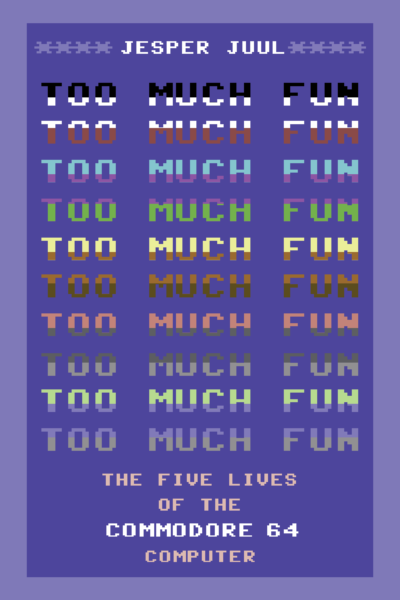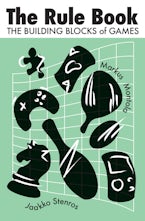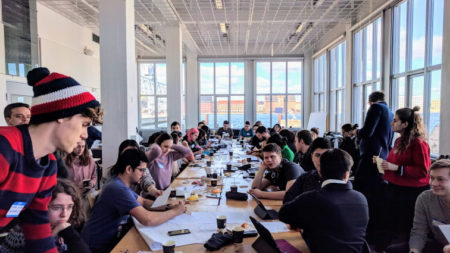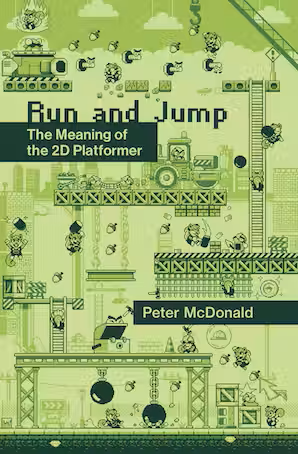At the Royal Danish Academy, we are inviting applications for prequalification for an upcoming fellowship opportunity: the Novo Nordisk Foundation’s 2025 Mads Øvlisen PhD fellowships in art history and practice-based research.
Too Much Fun: The book cover
And we have a cover for my upcoming book (December 10th, 2024). https://mitpress.mit.edu/9780262549516/too-much-fun/

My upcoming book, Too Much Fun: The Five Lives of the Commodore 64 Computer
I am happy to announce that I have finished the page proofs for my new book, Too Much Fun: The Five Lives of the Commodore 64 Computer. Coming on December 10th, 2024. Feel free to preorder!
I will post more as we get closer to the publication date.
https://mitpress.mit.edu/9780262549516/too-much-fun/

The Rule Book: The Building Blocks of Games
 Presenting The Rule Book: The Building Blocks of Games by Jaakko Stenros and Markus Montola. Out now on MIT Press in the Playful Thinking series.
Presenting The Rule Book: The Building Blocks of Games by Jaakko Stenros and Markus Montola. Out now on MIT Press in the Playful Thinking series.
How games are built on the foundations of rules, and how rules—of which there are only five kinds—really work.
Board games to sports, digital games to party games, gambling to role-playing games. They all share one thing in common: rules. Indeed, rules are the one and only thing game scholars agree is central to games. But what, in fact, are rules? In The Rule Book, Jaakko Stenros and Markus Montola explore how different kinds of rules work as building blocks of games. Rules are constraints placed on us while we play, carving a limited possibility space for us. They also inject meaning into our play: without rules there is no queen in chess, no ball in Pong, and no hole in one in golf.
Stenros and Montola discuss how rules constitute games through five foundational types: the explicit statements listed in the official rules, the private limitations and goals players place on themselves, the social and cultural norms that guide gameplay, the external regulation the surrounding society places on playing, and the material embodiments of rules. Depending on the game, rules can be formal, internal, social, external, or material.
By considering the similarities and differences of wildly different games and rules within a shared theoretical framework, The Rule Book renders all games more legible.
Visual Game & Media Design application deadline March 1st!
 Please join us for our Visual Game & Media Design two-year master’s program in Copenhagen!
Please join us for our Visual Game & Media Design two-year master’s program in Copenhagen!
The application deadline is March 1st.
Read more about the program here:
https://royaldanishacademy.com/programme/visual-game-and-media-design
Peter D. McDonald: Run and Jump, The Meaning of the 2D Platformer

Out now in the Playful Thinking series: Peter D. McDonald: Run and Jump, The Meaning of the 2D Platformers.
We are proud to present Peter D. McDonald’s new book.
“How abstract design decisions in 2D platform games create rich worlds of meaning for players.
Since the 1980s, 2D platform games have captivated their audiences. Whether the player scrambles up the ladders in Donkey Kong or leaps atop an impossibly tall pipe in Super Mario Bros., this deceptively simple visual language has persisted in our cultural imagination of video games. In Run and Jump, Peter McDonald surveys the legacy of 2D platform games and examines how abstract and formal design choices have kept players playing. McDonald argues that there is a rich layer of meaning underneath, say, the quality of an avatar’s movement, the pacing and rhythm of level design, the personalities expressed by different enemies, and the emotion elicited by collecting a coin.
To understand these games, McDonald draws on technical discussions by game designers as well as theoretical work about the nature of signs from structuralist semiotics. Interspersed throughout are design exercises that show how critical interpretation can become a tool for game designers to communicate with their players. With examples drawn from over forty years of game history, and from games made by artists, hobbyists, iconic designers, and industry studios, Run and Jump presents a comprehensive—and engaging—vision of this slice of game history.”
Visual Game & Media Design open house Jan 30th at 14:30 CET
We have an online open house for our 2-year Visual Game & Media Design Master’s Program at the Royal Danish Academy in Copenhagen.
Join us Tuesday January 30th at 14:30 Copenhagen time.
Details Here: https://kglakademi.dk/kalender/visual-game-and-media-design
Handmade Pixels: The Sam Roberts Interview
For Handmade Pixels, I interviewed some really interesting people in indie games. The interviews are excerpted in the book, but I am slowly putting the full interviews online.
Handmade Pixels is about the history of (the idea of) indie games, and these 2017-2018 interviews provide a window into the thinking at the end of the 20-year time span the book covers.
Here is my interview with Sam Roberts, festival director of IndieCade, where we discuss IndieCade and film festivals, the meaning of indie, and the fear of missing the Next Big Thing.
https://www.jesperjuul.net/handmadepixels/interviews/roberts.html
